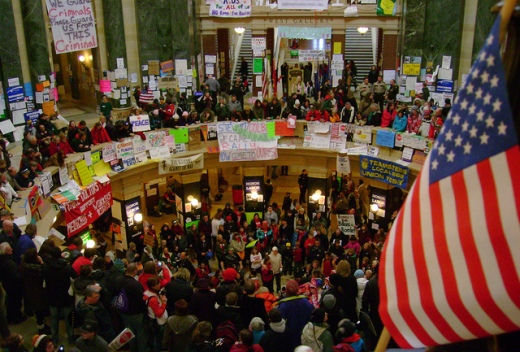
MADISON, Wisc. — Wisconsin’s Capitol had more than 100,000 people Saturday, Feb. 26, all coming to support the state’s public service workers in their fight against Republican Governor Scott Walker’s plan to dismantle their freedom to join unions and exercise democracy in the places where they work.
Across the U.S. other rallies gathered over 30,000 more in solidarity with the workers’ message.
In Indianapolis, nearly 25,000 people demonstrated against a plan to turn their state into another so-called “right to work” state after a weeks of demonstrations there successfully killed three bills which targeted the jobs of working families, their benefits, and the right to bargain collectively.
Ohio saw similar protests in its capital, Columbus.
From Alaska to Miami, and Maine to Hawaii, the chant was “We are all Wisconsin.” And in Wisconsin, what was the message?
The labor movement has made itself clear: they are willing to work with state government in managing benefits to cope with the budget crisis and want to negotiate. It is Gov. Walker who will not negotiate, as his admitted goal is to dismantle the unions themselves. The protests are against the parts of the budget bill that seek to put an end to the collective bargaining process and, consequently, destroy workers’ freedom to determine the conditions of their work.
Numerous signs carried by school teachers called on Gov. Walker to sit at the bargaining table, and included the definition of the word negotiate to help him in case he misunderstood. (Story continues after slideshow.)
Public employee union, AFSCME’s green placards reiterated the idea that the protesters stood for democracy with “It’s about Freedom” printed across them in white.
This message has become widespread. While the benefits union membership results in are tangible and important, demonstrators are discussing how those benefits and protections are a result of the union as a democratic organization that represents them. The union provides workers with a voice. Unlike a private business, or a corporation with its restriction on decision making based on how much stock one can buy, unions represent all workers in an occupation through their participation and votes.
For many who feel the country has been hijacked by corporate power this model is appealing. It paves the way for discourse on power and how the economy itself might be made more democratic.
Being a long-time proponent of this vision of a democratic economy, I went to Madison on Saturday to witness the historic demonstrations there. I talked with many people who shared sentiments similar to mine. The lively corridors of the Capitol, walls covered with print-outs of statistics, messages of solidarity, and humorous signs, hummed with the sound of debate, discussion, and music. The experience was surreal, which is somewhat sad because it also seemed to be exactly what self-government ought to be.
When it was time for me to leave I sought a volunteer on trash collection duty and recycled an extra flier I was handed.
Waiting for the buses that would take us back to the demonstrator parking, a public employee leaned over to a woman nearby and said “Hi, I’m one of the union thugs you’ve probably heard about.”
She shook his hand and introduced herself as “the greedy teacher.”
I couldn’t help myself. “Hi,” I said “I’m one of the Communists here today.”
The teacher responded, “Uh-oh, Glenn Beck warned me about you!”
We all had a good laugh and left firm in our belief that, no matter what the corporate hegemony might say about it, we had stood as one.
Jean Paul Holmes is a writer and social media activists. You can follow him on Twitter: @JeanPaulHolmes.
Photos: (Jean Paul Holmes/PW)

MOST POPULAR TODAY

High Court essentially bans demonstrations, freedom of assembly in Deep South

UN warns that Israel is still blocking humanitarian aid to Gaza


Resource wars rage in eastern Congo, but U.S. capitalism only sees investment opportunity

U.S. imperialism’s ‘ironclad’ support for Israel increases fascist danger at home






Comments